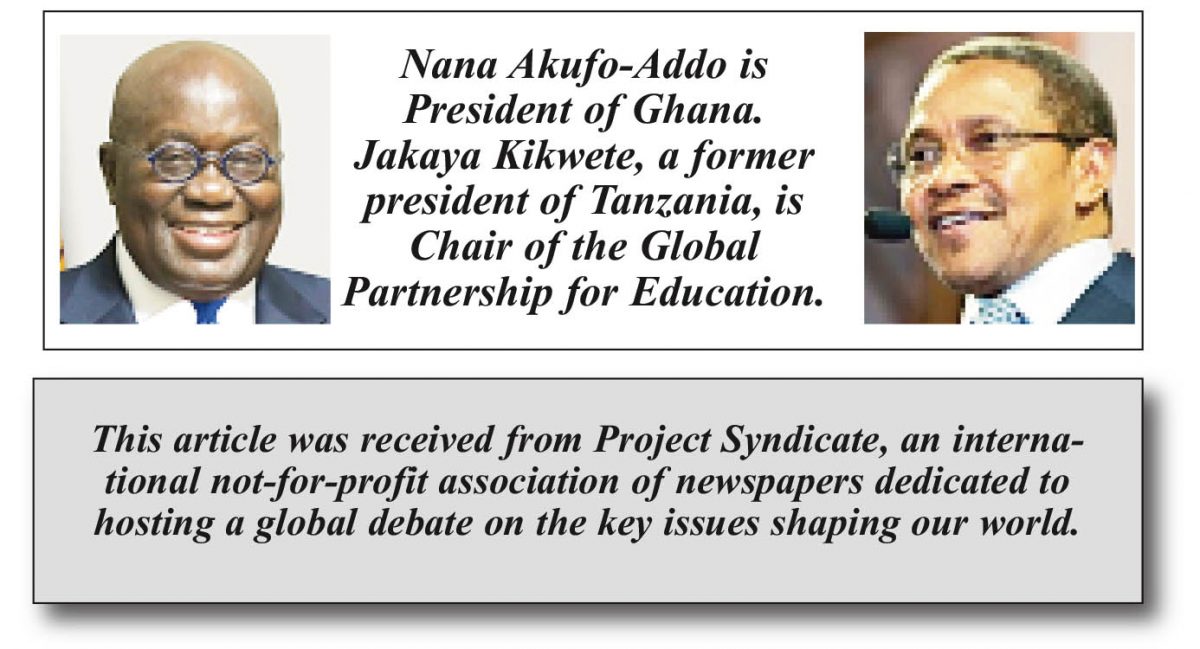By Nana Akufo-Addo and Jakaya Kikwete
ACCRA – The International Day of Education (January 24) is a good time to reflect on education’s essential role in achieving a peaceful and prosperous world. The severe impact that the COVID-19 pandemic, the global food and fuel crises, and climate change have had on the learning experience of millions of children worldwide, especially those in lower-income countries, has underscored the need for new thinking.
After three years of constant disruption, global education has reached a tipping point. An educated population is humanity’s most valuable resource, yet our collective failure to address the education crisis poses a grave threat to the future prospects of hundreds of millions of girls and boys, darkening entire countries’ social and economic horizons.
Before the onset of COVID-19, more than 250 million children were out of school, and half of all students in low- and middle-income countries finished primary school without basic reading comprehension skills. The pandemic, which disproportionately affected lower-income countries, has exacerbated these shocking disparities, placing an additional 24 million children and youth at risk of dropping out permanently. The share of children in low- and middle-income countries unable to read and understand a simple story by age ten has increased to nearly 70%.
These figures highlight the urgent need for bold multilateral action to ensure that all children worldwide receive 12 years of quality education. Last September’s Transforming Education Summit at the United Nations in New York, which brought together representatives from more than 100 countries to discuss how to respond to the global learning crisis, ended on a hopeful note, with world leaders acknowledging that real change requires increased funding at the national level.
Lower-income countries are keenly aware of this need. In 2021, the Heads of State Declaration on Education Financing called on political leaders to ensure that at least 20% of their countries’ public spending is allocated to education. More than 20 countries, most of them African, have already committed to investing $200 billion over five years to help girls and boys learn – and the momentum is growing.
But donor countries must also recognize the urgency of addressing inequalities in educational opportunities and provide rapid, coordinated support to countries in need. One way they could do this is by committing to fund the Global Partnership for Education (GPE), which supports low-income countries in transforming their national education systems.
The most urgent task facing global reformers is to increase education budgets in struggling low- and middle-income countries. Even before the pandemic and the current wave of monetary tightening, debt payments exceeded spending on education, health, and social services in one out of eight countries, severely constraining what these countries can do to improve children’s access to education and increase school completion rates.
But time is not on our side. In addition to fiscal challenges and systemic inequities, climate change could displace 143 million people (more than the entire population of Mexico) by 2050, further underscoring the pressing need to reshape our education systems.
Responding to these global crises requires a transformation that benefits all of the world’s children, starting with the most marginalized. To reduce gender disparities, for example, policymakers must place gender equality at the center of their education policies, from planning to implementation.
Ensuring that all children have basic literacy and numeracy skills is among the leading challenges of our time. To help students navigate the upheavals of rapid technological growth, our education systems must harness technology as part of a broader, systemic effort to reimagine learning. And by inculcating adaptability and resilience, we can prepare students to deal with the uncertainty of the twenty-first century.
Children are our most important assets, and investing in their imagination and creativity is an investment in possibilities to change our world for the better. By providing children around the world with an equal chance to achieve their aspirations, we can help to ensure the stability and prosperity of their communities. But our ability to imagine, plan, and implement solutions that prepare our children for the coming upheavals and enable them to address the most pressing crises facing humanity requires more funding.
Unless we address the global education crisis, we cannot expect the next generation to bail us out of the calamities we cannot resolve by ourselves. As former US President Franklin D. Roosevelt observed in an address at the University of Pennsylvania 82 years ago, “We cannot always build the future for our youth, but we can build our youth for the future.”
Copyright: Project Syndicate, 2023.

